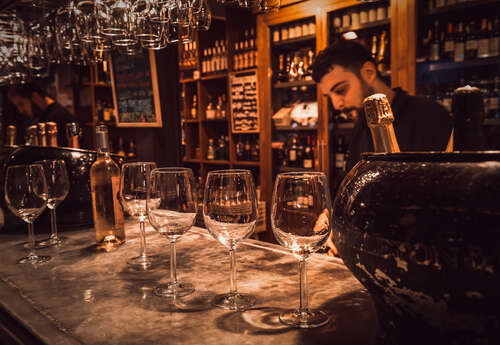There is little need for me to provide a recap of the numerous myths spun around the notion of terroir, starting with the fantasy implied by the use of the word itself.
This word was probably originally forged along similar lines to the verb terroiter, which is seldom found in old French dictionaries but bears the rather pejorative sense of a rustic wine, one without elegance, and was perhaps used in much the same way as the verb tracer is employed today in Champagne.
This last is a term used for a wine incapable of assuming the qualities of “refinement” resulting from blending, which in turn is a technique based on human experience and proficiency.
Terroir and terre
It’s clear, however, that the word “terroir” contains the word terre and therefore bears within it the notion of soil. This simple fact alone has convinced people around the world that the taste of all high-quality wines is derived from the soil in which they were grown.
This perception formed the basis of the concept of an appellation, which binds a wine tightly to its production zone—a notion that France has conferred upon the world of wine at large. This concept has, in turn, been taken up and used by a wide variety of other products, whether derived from agriculture or not.
The question as to whether this linkage is an example of brilliant marketing or the result of an almost filial devotion to Mother Nature remains unanswered.
This issue has been entrenched and legitimized by the use of the term in all countries where good wines are produced and is particularly valid in cases where the definition of the word “terroir” includes the actions of human beings. But doubts on the interpretation of the term are cast by a conspiratorial fringe of idealists, who unthinkingly associate human intervention with artifice, casting it as a betrayal of the “truth,” or even as an out-and-out fraud.
For these true believers, everything is ultimately derived from the “genius” of the soil itself. They believe that the earth in which the vine grows not only supports the plant but protects it and defines the authentic taste of the wine it produces.

Rocky soil in Cabardes in the Languedoc. Photography by Ryan O’Connell / Flickr
They are armored in a philosophy that links together notions of minerality, mineralization, and an absolute belief in the geological matrices that underpin the vineyards, themselves the result of action by rain and wind over millions of years—a concatenation of elements all working harmoniously together toward an end that requires the absolute minimum of human intervention to reach its zenith.
You need to draw a pretty long bow before you can unite nature, geomorphology, biology, and, yes, enology—because after all, the liquid needs to ferment—in such a way as to allow all these moving parts to bow down in subservience to nature’s providence. The smartest of the advocates of this argument—few and far between though they are—are also interested in those influences pertaining to the above-ground portion of the vine.
They are prepared to give due acknowledgment to creative human practices that consist of more than merely monitoring the vines and, instead, act to “give birth” to good grapes. It is self-evidently true that we need to prune and train our vines so that they can produce not only grapes but grapes fit to produce wine via the intermediary of the fermentation process.
Matters of taste
But what of taste? We obviously need to find common ground in the way that we define what is authentic and qualitative when it comes to matters of taste, without consideration of what the origin of the grapes may bring to the table.
Many generations of wine producers have refined and perfected their practices according to the needs dictated by their grapes, their viticultural traditions, and, above all else, their own tastes—and none of this has changed over the course of the past 20 or so centuries.
Nevertheless, the evolution of our theoretical framework and the development of new technologies have, over the course of less than a century, overthrown every belief that we once took for granted—and all that at a time when we were beginning to codify our viticultural heritage.
Technology now enhances and transforms the physical impact of humans (and animals); the mystery of fermentation has given way to a precise and rigorous knowledge that allows the process to be controlled; and the attitude of consumers toward wine has been transformed—from regarding it as a nourishing and necessary daily drink, into one in which wine is perceived as a hedonistic pleasure.
Other opinions and beliefs may once have been held by those who came from cultures without wine traditions, from regions other than those where Vitis vinifera was born and spread out across the landscape, but these people have become part of our tribe and now make wine, drink wine, and appreciate wine.
Some of us may regret this fact, and perhaps can even be a little bit afraid of these changes. It’s this fear and regret that have led to a return to the desire for “local” production, for the terroir of the homeland, and, therefore, for a world view that limits itself to a desire for tiny artisanal production that is, alas, so liminal in terms of global trade.
We should, in truth, fear these fundamentalists, those who will shamelessly ask us, “What gives you the right to say that oxidative flavors, mousiness, and all those characters that you consider to be deviations from the norm are not, in fact, the true taste of terroir, a taste that can be found only in wines that are made without manipulation or interference by human hand?”
If some restaurateurs served us food as rotten and rancid as the wines they apparently prefer, what kind of reply would they be able to give to this question?
Social convention and a respect for the norm is not a lazy submission to habit—rather, these characteristics are the very guarantee of a civilized society.






